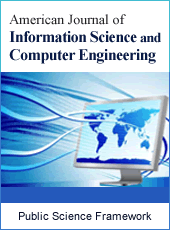American Journal of Information Science and Computer Engineering
Articles Information
American Journal of Information Science and Computer Engineering, Vol.1, No.3, Sep. 2015, Pub. Date: Aug. 17, 2015
Energy-Efficient Routing Protocols in Presence of the Mobile Sink in Wireless Sensor Networks
Pages: 117-125 Views: 5172 Downloads: 1449
[01]
Bahadorani Mahjobeh, Faculty of Technical and Engineering, Islamic Azad University, Ardabil, Iran.
[02]
Jamali Shahram, Department of Computer Engineering, University of Mohaghegh Ardabili, Ardabil, Iran.
Wireless sensor networks (WSN) consist of small-sized sensor nodes and inexpensive short-range radio communication. One of the known features in wireless sensor nodes is the limited battery supply. On the other hand, replacing the battery in wireless sensor networks is difficult and often is impossible. Therefore, it is essential to employ an energy- efficient routing protocol for minimizing energy consumption in these networks. In this paper, we provide a deeper understanding of energy- efficient routing protocol for mobile sink. We describe the reduction factors of energy in wireless sensor networks. Moreover, the sink node mobility explain, which it is one of the most challenging factors in the energy consumption of these networks. Then, discuss a comprehensive survey about various energy strategies and protocols in the sink node mobility. These energy- efficient routing protocols can be class based on their performance, into two categories such as: source- initiated and sink-initiated. For each category, we present several examples of protocols. In each samples, protocol pay the sink node mobility and energy storage. Also, with comparing the protocols to each other, we can emphasize on the advantages and disadvantages of each sample protocols.
Energy-Efficient, Sink Mobility, Routing Protocol, Wireless Sensor Network
[01]
C. Suh, Y.-B. Ko, and D.-M. Son, “An energy efficient cross-layer MAC protocol for wireless sensor networks,” in Advanced Web and Network Technologies, and Applications, Springer, 2006, pp. 410–419.
[02]
H. Huang, G. Hu, F. Yu, and Z. Zhang, “Energy-aware interference-sensitive geographic routing in wireless sensor networks,” IET Commun., vol. 5, no. 18, p. 2692, Dec. 2011.
[03]
F. Ye, H. Luo, J. Cheng, S. Lu, and L. Zhang, “A two-tier data dissemination model for large-scale wireless sensor networks,” in Proceedings of the 8th annual international conference on Mobile computing and networking, 2002, pp. 148–159.
[04]
B. D. Lee and K. H. Lim, “An energy-efficient hybrid data-gathering protocol based on the dynamic switching of reporting schemes in wireless sensor networks,” IEEE Syst. J., vol. 6, no. 3, pp. 378–387, 2012.
[05]
J.- W. Kim, J.-S. In, K. Hur, J.-W. Kim, and D.-S. Eom, “An intelligent agent-based routing structure for mobile sinks in WSNs,” Consum. Electron. IEEE Trans., vol. 56, no. 4, pp. 2310–2316, 2010.
[06]
Wang, Y. Yin, J. Zhang, S. Lee, and R. Sherratt, “Mobility based energy efficient and multi-sink algorithms for consumer home networks,” Consum. Electron. IEEE Trans., vol. 59, no. 1, pp. 77–84, 2013.
[07]
H. S. Kim, T. F. Abdelzaher, and W. H. Kwon, “Minimum-energy asynchronous dissemination to mobile sinks in wireless sensor networks,” in Proceedings of the first international conference on Embedded networked sensor systems - SenSys ’03, 2003, pp. 193–204.
[08]
C. Intanagonwiwat, R. Govindan, and D. Estrin, “Directed diffusion: a scalable and robust communication paradigm for sensor networks,” in Proceedings of the 6th annual international conference on Mobile computing and networking, 2000, pp. 56–67.
[09]
P. Madhumathy, D. Sivakumar, and V. Networking, “Enabling energy efficient sensory data collection using multiple mobile sink,” Commun. China, vol. 11, no. 10, pp. 29–37, 2014.
[10]
C. Suh, Y.-B. Y. Ko, D. D.-M. Son, H. Salarian, K.-W. Chin, and F. Naghdy, “An energy-efficient mobile-sink path selection strategy for wireless sensor networks,” Veh. Technol. IEEE Trans., vol. 63, no. 5, pp. 2407–2419, 2014.

ISSN Print: 2381-7488
ISSN Online: 2381-7496
Current Issue:
Vol. 7, Issue 3, September Submit a Manuscript Join Editorial Board Join Reviewer Team
ISSN Online: 2381-7496
Current Issue:
Vol. 7, Issue 3, September Submit a Manuscript Join Editorial Board Join Reviewer Team
| About This Journal |
| All Issues |
| Open Access |
| Indexing |
| Payment Information |
| Author Guidelines |
| Review Process |
| Publication Ethics |
| Editorial Board |
| Peer Reviewers |


